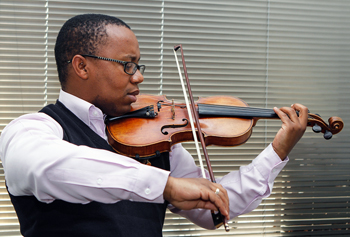Latest News Archive
Please select Category, Year, and then Month to display items
04 April 2024
|
Story Lunga Luthuli
|
Photo SUPPLIED
 Dr Juliet Kamwendo champions gender-inclusive climate action in Africa. Her expertise at the recently held AFR100 workshop highlighted vital steps towards sustainable and equitable development.
Dr Juliet Kamwendo champions gender-inclusive climate action in Africa. Her expertise at the recently held AFR100 workshop highlighted vital steps towards sustainable and equitable development.
Dr Juliet Kamwendo, Lecturer and Programme Director for Gender Studies in the Centre for Gender and Africa Studies at the University of the Free State, is spearheading efforts to integrate gender considerations into Africa's climate restoration agenda. Reflecting on her involvement, Dr Kamwendo stated, "This is particularly crucial, as women make up almost 50% of the population in Africa, and the depletion and degradation of land affect them disproportionately."
She recently served as a gender expert at the AUDA-NEPAD AFR100 workshop in Ouagadougou, Burkina Faso, from 25 to 29 March 2024. This initiative aims to restore forests and degraded land across Africa by 2030, with a focus on gender equality.
The workshop emphasised the integration of gender perspectives into the AFR100 project, acknowledging the disproportionate impact of land degradation on women. Dr Kamwendo's expertise highlighted the need to empower women in climate change interventions, addressing existing gender inequalities exacerbated by environmental degradation.
“Women – who are primarily responsible for household food security and water provision – bear the brunt of environmental degradation, leading to increased workloads, reduced income opportunities, and heightened vulnerability to climate-related disasters. Furthermore, the loss of forest cover and biodiversity further exacerbates the challenges faced by women, particularly in rural areas where they depend heavily on natural resources for their livelihoods,” added Dr Kamwendo.
Her participation highlights academia's crucial role in fostering inclusive and sustainable development, emphasising interdisciplinary collaboration to tackle complex environmental challenges. Through initiatives such as AFR100, stakeholders are working towards a more resilient and gender-responsive future for Africa.
Odeion String Quartet receives international acclaim
2014-12-22
 |
The Odeion String Quartet (OSQ) is a flagship of the UFS and symbolises the university’s commitment to the arts. Most recently, the OSQ walked away with the award for Best Classical Music Performance at the 2014 Kanna ceremony.
It was established in 1991 as a permanent full-time resident string quartet – at present the only resident string quartet at a South African university – and functions as an independent academic department at the UFS.
The members of the quartet are Samson Diamond (leader and first violin), Sharon de Kock (violin), Jeanne-Louise Moolman (viola) and Anmari van der Westhuizen (cello). They have an extensive national and international background and are highly regarded in music circles as soloists and chamber musicians. The members of the quartet play an important strategic role in the development of symphony orchestra music and in classical music training in the Free State. They are exemplary teachers and attract students from all over the country. The Junior Odeion String Quartet and Odeion Sinfonia provide a unique chamber music training experience to selected students.
They regularly perform to critical acclaim in all the major music centres in South Africa, as well as in SADC countries such as Zimbabwe and Zambia. During 2013 they performed at concerts in Belgium, Germany and Switzerland, where they received standing ovations and very positive reviews.
The quartet is also set on giving back to musical communities around the country, with workshops offering guidance on playing techniques and life-skills that are essential for young people who intend to pursue a career in the music sector.